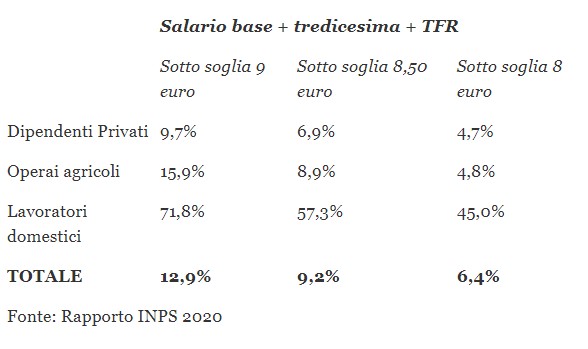What will the government do about the minimum wage?

The introduction of a legal minimum wage is being discussed, but the crux of the law on representation with trade unions remains. Giuliano Cazzola's analysis
"The man of the mountain" has not yet said yes. But maybe. Out of metaphor, Maurizio Landini (who was born in Castelnuovo dei Monti) on the occasion of the “three days” (Futura 2021) of the CGIL in Bologna, declared that the “minimum wage” can be discussed; the important thing is to save collective bargaining, through a law on representation that allows it to be valid erga omnes, in spite of “pirate contracts”. Landini's reasoning is flawless, but actually evokes the behavior of a gentleman who, in order to wear trousers without running the risk of staying in his underwear, uses both suspenders and a belt.
Encouraged by the revival of the minimum wage underway in Brussels, the Draghi government seems willing to adopt an Italian version precisely to get rid of the puzzle of recognizing the general value of contracts, passing through the “caudine gallows of a law on representation”. A proposal for a directive of the Parliament and of the Council concerning the adequacy of the minimum wage in the Union is under consideration. Even impact assessments were carried out at that time. The quantitative analysis carried out on a scenario based on a hypothetical increase in minimum wages up to 60% of the median gross wage shows that such an increase would improve the adequacy of minimum wages in about half of the Member States. Between 10 and 20 million workers would benefit from these improvements.
In many countries, improvements in the protection afforded by the minimum wage would lead to a reduction of more than 10% in in-work poverty and wage inequalities and a reduction of at least about 5% of the gender pay gap. These improvements are expected to have positive repercussions also in terms of work incentives, as well as in relation to support for gender equality, and will help reduce the gender pay gap as women make up the majority of workers earning a minimum wage. (around 60% in the EU).
The expected economic impacts include an increase in labor costs for businesses, an increase in prices and, to a lesser extent, a reduction in profits. The impact on businesses would be mitigated by an increase in the consumption of low-wage workers, which would support domestic demand. Businesses, and SMEs in particular, would also benefit from more progressive and predictable increases in minimum wages, which would improve the business environment. According to forecasts, any negative impact on employment would be limited, remaining in most cases below 0.5% of the total employment rate, but reaching 1% in three Member States.
The benefits generated by improving the protection afforded by the minimum wage for the workers concerned would far outweigh any negative impact on the employment of those workers. Reduced impacts on competitiveness at the aggregate level are also expected.
The chosen package calls on all Member States to support collective bargaining on wage setting, particularly in cases where collective bargaining coverage is low, as well as to strengthen the application of minimum wages and the monitoring of their adequacy and coverage. . The package also requires, as regards Member States with statutory minimum wages, the use of clear and stable criteria to guide the setting and updating of minimum wages and a strengthened role for the social partners. It also limits the use of deductions from statutory minimum wages and variations thereof to the bare minimum. This should ensure sufficient flexibility to allow Member States to determine the pace of improvement in the adequacy of minimum wages in the light of economic conditions and economic risks, including in specific sectors, regions and SMEs.
In truth, a series of doubts would not be out of place. If the fight against poverty through welfare payments did not have the hoped-for success (as in our case the RdC), it is not certain that it is a viable alternative to achieve results through the ex lege increase in wages, also because the assumption of wages the existence of an employment relationship would always be minimal (the case of worker poors ) while its effects would affect a number of subjects in the EU, between 10 and 20 million, at this point borne by companies and without any consideration as regards the performance.
The proposed directive notes that, in recent decades, low wages have not kept pace with other wages in many Member States. Structural trends that have reshaped labor markets, such as globalization, digitization and the rise of atypical forms of work, particularly in the service sector, have led to greater labor polarization which has in turn generated an increase share of low-paid and low-skilled jobs, also contributing to a weakening of traditional collective bargaining structures. This has caused an increase in in-work poverty and in wage inequalities.
In her State of the Union address of September 2020 , President Ursula von der Leyen said: "The truth is that for too many people, work is no longer profitable: wage dumping destroys the dignity of work, penalizes the entrepreneur who pays decent wages and distorts fair competition in the single market. For this reason, the Commission will present a legislative proposal to support Member States in creating a minimum wage framework. Everyone must have access to minimum wages, whether through collective agreements or statutory minimum wages ”. At the time, in Italy, the possibility of achieving minum wage through collective bargaining, as required by the trade unions, was considered a sort of liberation. But the path has proved too complicated with regard to the goal of the erga omnes. Thus the government seems oriented to focus on the introduction of a legal minimum wage.
The hypothesis of setting a minimum corresponding to that of the "multiservices" National Collective Labor Agreement, about 8.50 euros / hour gross, is being examined, so that the law does not require public finance coverage since most of the PA entrusts work to companies that they use “multiservice” contracts.

This is a machine translation from Italian language of a post published on Start Magazine at the URL https://www.startmag.it/economia/salario-minimo-legale-governo-sindacati/ on Sun, 03 Oct 2021 06:44:30 +0000.
